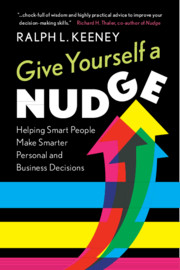Book contents
- Reviews
- Give Yourself a Nudge
- Give Yourself a Nudge
- Copyright page
- Dedication
- Contents
- Preface
- Acknowledgments
- 1 Nudge Yourself to Make Better Decisions
- 2 Your Decisions and Your Life
- 3 Making Value-Focused Decisions
- 4 Defining Your Decision
- 5 Identifying Your Values
- 6 Creating Alternatives
- 7 Identifying Decision Opportunities
- 8 Obtaining Authorization to Select Alternatives Controlled by Others
- 9 Becoming a Value-Focused Decision-Maker
- 10 Enhancing the Quality of Your Life
- 11 Useful Perspectives on Decision-Making
- Appendix Evaluating Alternatives and Making a Decision
- Notes
- Index
1 - Nudge Yourself to Make Better Decisions
Published online by Cambridge University Press: 17 April 2020
- Reviews
- Give Yourself a Nudge
- Give Yourself a Nudge
- Copyright page
- Dedication
- Contents
- Preface
- Acknowledgments
- 1 Nudge Yourself to Make Better Decisions
- 2 Your Decisions and Your Life
- 3 Making Value-Focused Decisions
- 4 Defining Your Decision
- 5 Identifying Your Values
- 6 Creating Alternatives
- 7 Identifying Decision Opportunities
- 8 Obtaining Authorization to Select Alternatives Controlled by Others
- 9 Becoming a Value-Focused Decision-Maker
- 10 Enhancing the Quality of Your Life
- 11 Useful Perspectives on Decision-Making
- Appendix Evaluating Alternatives and Making a Decision
- Notes
- Index
Summary
A large collection of practical studies and research has identified numerous shortcomings in both the intuitive and conscious thought processes that we use to make decisions. It is now also well understood that the alternatives that individuals choose are greatly influenced by the presentation of those alternatives. Led by Professor Richard Thaler, the field of behavioral economics has developed numerous ways to present decision alternatives to individuals that influence them to choose better alternatives in terms of their interests. That influence is referred to as a nudge. When facing decisions, individuals routinely make two serious errors in their intuitive decision processes. First, our natural way of making decisions is backwards. We think about alternatives to solve decisions before we know what we want to achieve by solving them. Second, most of the decisions that we end up facing are decision problems that occur beyond our control. This book shows that, by better framing and understanding their decisions, decision-makers can nudge themselves to create and select better alternatives for the decisions they face. It describes the specific decision-making skills that it is important to develop and presents concepts and procedures to do this.
- Type
- Chapter
- Information
- Give Yourself a NudgeHelping Smart People Make Smarter Personal and Business Decisions, pp. 1 - 9Publisher: Cambridge University PressPrint publication year: 2020

